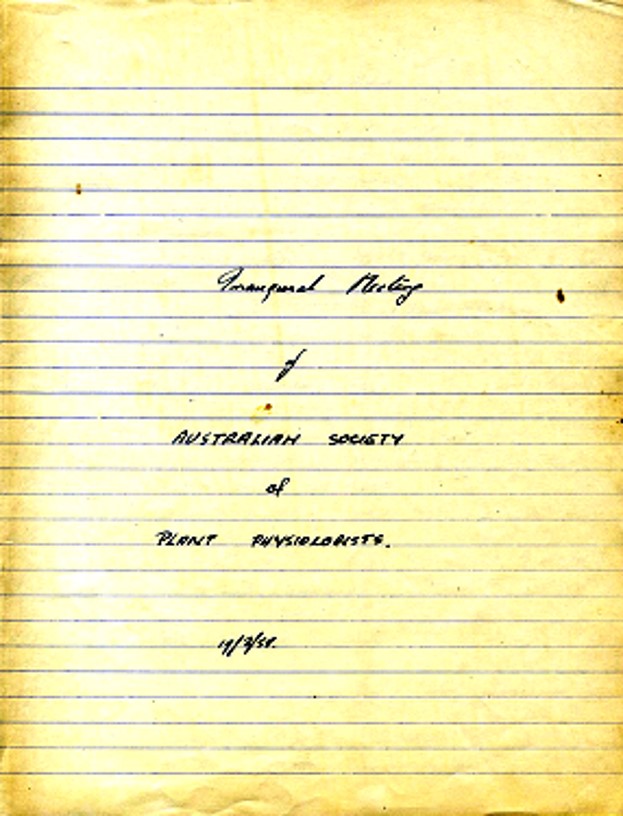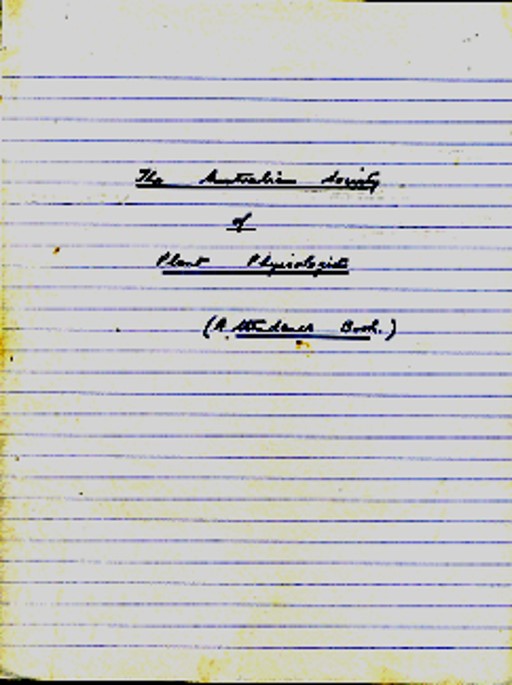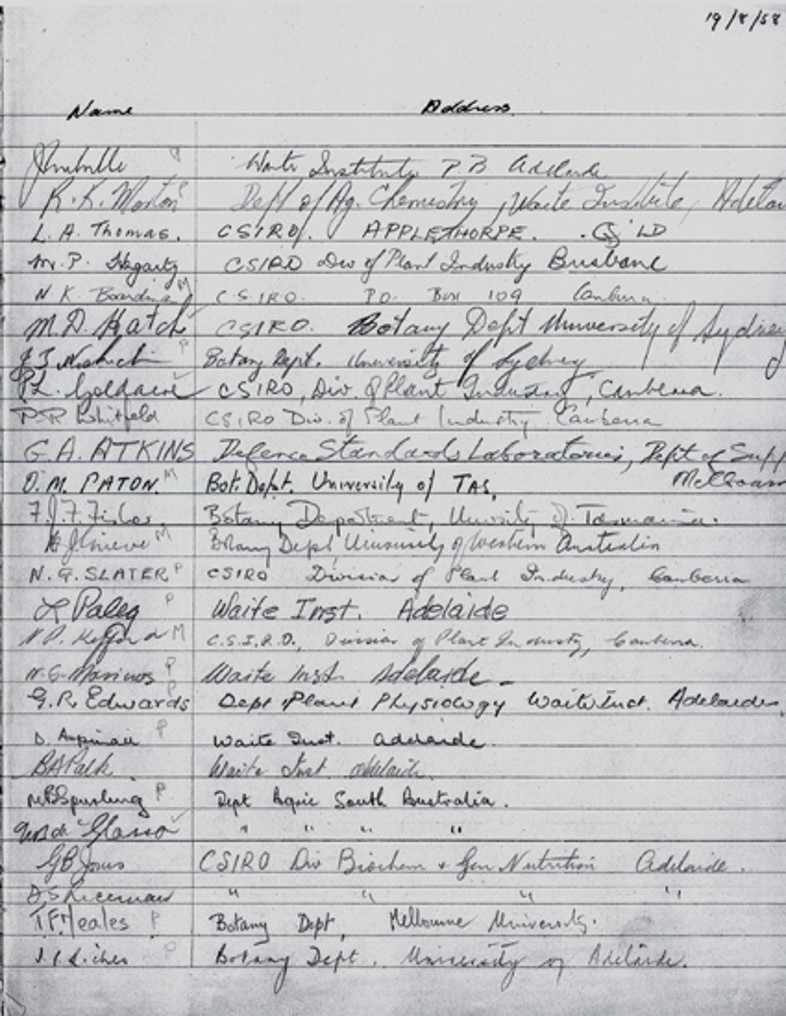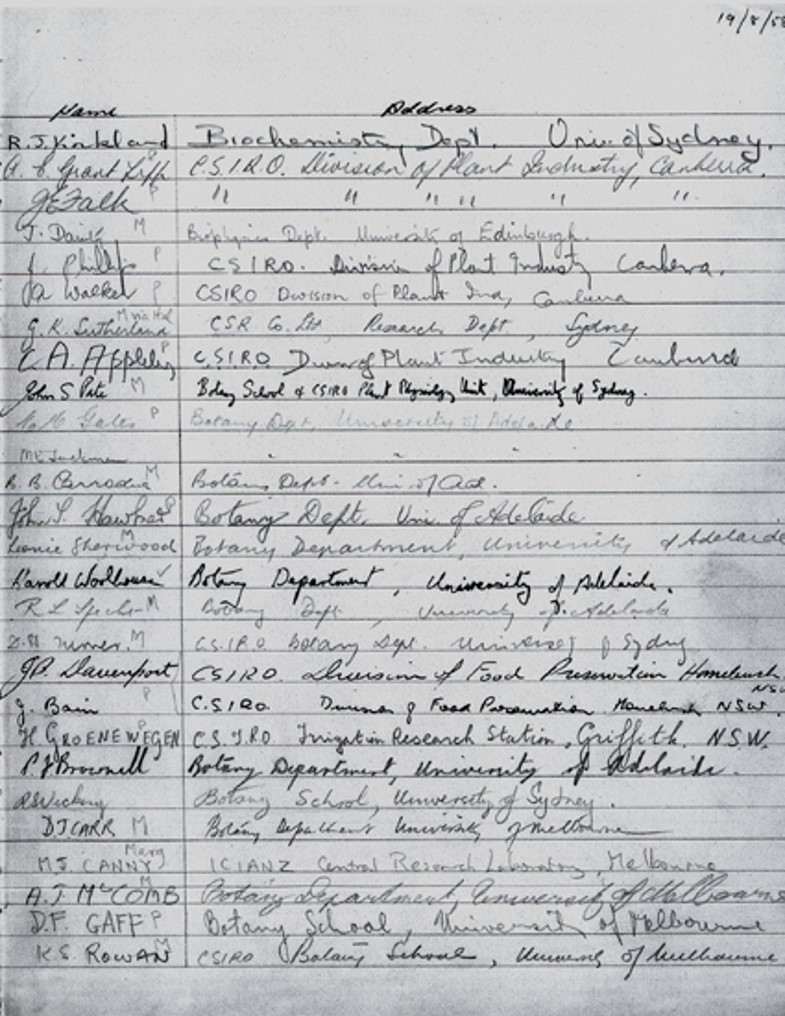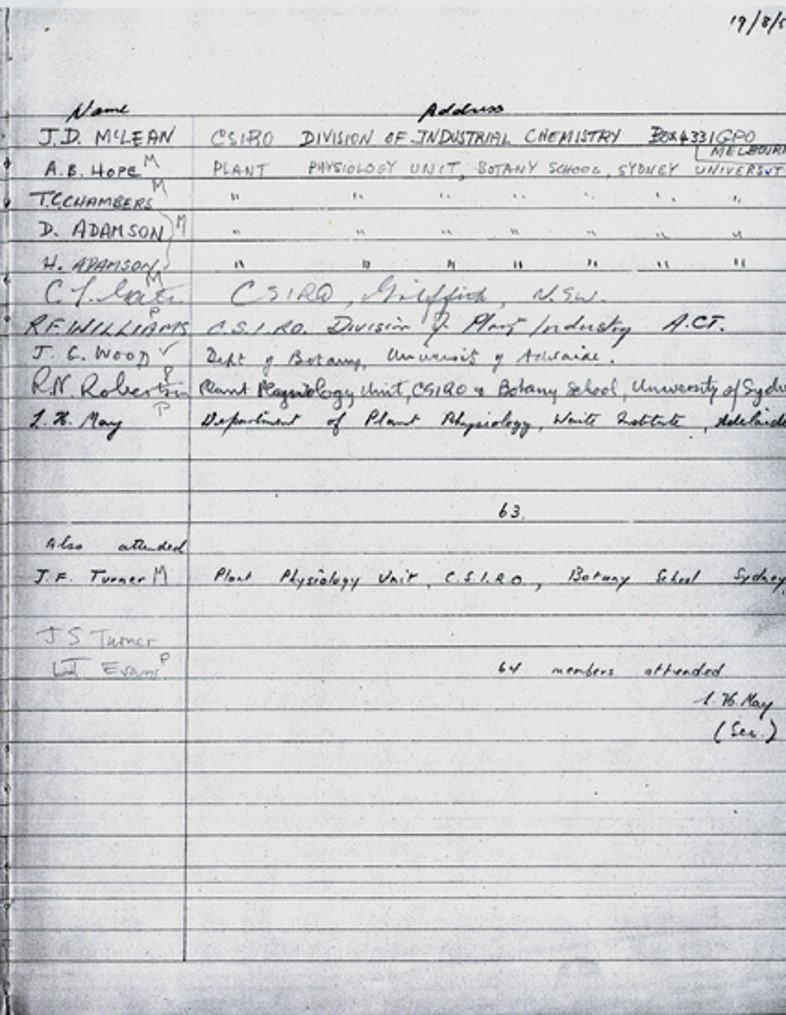- About
- Members
- Join
- Member log in
- Membership Renewal
- Member directory
- Life Members
- ASPS Life Member Professor Graham Farquhar
- ASPS Life Member Associate Professor Hendrik (Hank) Greenway
- ASPS Life Member Dr Marshall (Hal) D Hatch
- ASPS Life Member Dr Paul E Kriedmann
- ASPS Life Member Dr Mervyn Ludlow
- ASPS Life Member Emeritus Professor Rana Munns
- ASPS Life Member Conjoint Professor Christina E Offler
- ASPS Life Member Professor (Charles) Barry Osmond
- ASPS Life Member Emeritus Professor John W Patrick
- ASPS Life Member Dr Joe Wiskich
- Corresponding Members
- Elected Fellows
- Events
- Awards & Funding
- Employment
- Publications
- Research
- Teaching
- Menu
Count down to 60 years of ASPS – The beginning
14 August 2018
Count down to 60 years of ASPS
Dear ASPS members,
with about 6 weeks until ComBio 2018, make sure you check the website for a new post to Phytogen each Monday. This beginning post has been emailed to start you off and will be on our website after that (https://www.asps.org.au/)
The posts will be :
Tuesday 14th August — The beginning
Monday 20th August — Thoughts from some of our leaders
Monday 27th August — Rewarding excellence
Monday 3rd September — Growing up within ASPS
Monday 10th September — Plants in Action
Monday 17th September — Why we need more women
we hope you will enjoy reading, hint: after this coming Monday’s post, you will be able to like on our Societies facebook page (https://www.facebook.com/ASPSozplants) post a pebble if you like and that will feed through to twitter also, Kind Regards, the ASPS Website & Communications Sub-Committee (WSCS).
ASPP/ASPS — The beginning
We are in the process of writing a history of the Society planned for publication in 2019. This blog is a taste of the Society’s beginnings, but we are aware of gaps in our narrative. Should anyone have other relevant information that you would be willing to share, we would be most appreciative.
Tina Offler and John Patrick, University of Newcastle
 The mid-1940s onward witnessed a burgeoning growth in plant physiology research spread across CSIRO, State Departments of Agriculture and Universities. It was within this environment that Bob Robertson (to become Sir Rutherford Roberson and affectionately referred to as Sir Bob), in 1957, proposed the formation of ASPP to a group of leading national-based plant physiologists (Neales 1994). The group agreed to convene a one-day meeting linked with the programmed Adelaide Australian and New Zealand Association for the Advancement of Science (ANZAAS) conference. The one-day event was held on August 19, 1958 at which 12 papers were presented by GA Atkins, Peter Brownell, Martin Canny, Jack Dainty, Alex Hope, Ned Krefford, Nick Marinos, JD McLean, John Pate, Dugald Paton, Bob Williams and Harold Woolhouse. At the inaugural General Meeting held that afternoon, chaired by Sir Bob, the ASPP Constitution was approved along with the election of Lance May (Adelaide) as Honorary Secretary, Les Paleg (Adelaide) as Honorary Treasurer and Joseph Garnett Wood (Adelaide) as the first President. There seems to be some disparity in reports of the number of delegates attending the meeting with 64 and 69 reported and the original record of attendees having 66 signatures. However, what is not in dispute is that many of the signatures on these fading sheets of paper are of those you will recognise for their significant contributions to Australian Plant Science and to our society. To name but a few: Bob Robertson, John Pate, Alan Walker, Lloyd Evans, Peter Brownell, Hal Hatch, Harold Woolhouse, Martin Canny and so it goes on and on……
The mid-1940s onward witnessed a burgeoning growth in plant physiology research spread across CSIRO, State Departments of Agriculture and Universities. It was within this environment that Bob Robertson (to become Sir Rutherford Roberson and affectionately referred to as Sir Bob), in 1957, proposed the formation of ASPP to a group of leading national-based plant physiologists (Neales 1994). The group agreed to convene a one-day meeting linked with the programmed Adelaide Australian and New Zealand Association for the Advancement of Science (ANZAAS) conference. The one-day event was held on August 19, 1958 at which 12 papers were presented by GA Atkins, Peter Brownell, Martin Canny, Jack Dainty, Alex Hope, Ned Krefford, Nick Marinos, JD McLean, John Pate, Dugald Paton, Bob Williams and Harold Woolhouse. At the inaugural General Meeting held that afternoon, chaired by Sir Bob, the ASPP Constitution was approved along with the election of Lance May (Adelaide) as Honorary Secretary, Les Paleg (Adelaide) as Honorary Treasurer and Joseph Garnett Wood (Adelaide) as the first President. There seems to be some disparity in reports of the number of delegates attending the meeting with 64 and 69 reported and the original record of attendees having 66 signatures. However, what is not in dispute is that many of the signatures on these fading sheets of paper are of those you will recognise for their significant contributions to Australian Plant Science and to our society. To name but a few: Bob Robertson, John Pate, Alan Walker, Lloyd Evans, Peter Brownell, Hal Hatch, Harold Woolhouse, Martin Canny and so it goes on and on……
The CSIRO/Botany School Unit, headed by Bob Robertson, and housed in the Sydney University Botany Department was the core from which ASPP grew and expanded. Bob Robertson’s group comprised a dozen or so young plant physiologists who were to make major advances in our science, including Hal Hatch, Alex Hope, Jack Dainty (from Edinburg, UK), John Pate, Carrick Chambers, Don and Heather Adamson, John (F) and Donella Turner. Bob brought 14 of its members to Adelaide for the Inaugural Meeting, and it wasn’t easy to get there!! In his “recollections” written for the 50th anniversary of the society, Martin Canny recounts that Hal Hatch said to me (Martin),
“Tell them how different it was, how difficult to get from Sydney to Adelaide.”
Apparently, in order to attend the Adelaide meeting he (Hal) had taken two days in trains, overnight from Sydney to Melbourne, with a midnight change at Albury to accommodate a shift in rail gauge from 4 feet 8 1/2 inches (New South Wales) to the Victorian line gauge of 5 feet 3 inches, then another overnight trip to Adelaide, with yet another change in railway gauge down to 3 feet 6 inches at the Victorian/South Australian boarder. And, there are other similar stories.
In the following year, the plant physiology community was saddened by the untimely death of JG (Joe) Wood (1900 -1959) just prior to the second meeting of ASPP convened in Sydney across three days. Sir Bob was elected as the second ASPP President, a position he served in until 1962. ASPP/ASPS has honoured these two foundation presidents for many years through the JG Wood and Robertson Lectures, presented by invitation biennially at ASPP/ComBio meetings in alternate years. Also, amongst the attendees at the inaugural meeting in Adelaide was a talented young plant scientist, Dr Peter Goldacre who tragically died in 1960 before being able to fulfil his full research potential. It is in his honour that the prestigious Peter Goldacre Award has been awarded to an outstanding early career plant scientist each year since 1965.
Neales Tom (1994). Our Society; An Historical Perspective. An early history of the Australian Society of Plant Physiologists. ASPP Membership Directory and reproduced (with permission) in Phytogen 11(2), 11-18.
ASPS dinner at ComBio2018
12 August 2018
ASPS dinner at ComBio2018
Dear ASPS member,
We hope to see you at the coming ComBio2018 in our spectacular city of Sydney.
If so, you might be interested to attend a dinner where you can discuss collaborative research and networking sitting with fellow scientists while enjoying magnificent Darling Harbour views with delicious food at a very affordable price!
We are organising this year’s ASPS dinner which will be held on Tuesday, 25th September at Zaaffran Restaurant. (https://www.zaaffran.com/). You can sit and enjoy this harbourside restaurant where you will be amused by a marvellous Darling Harbour night view. It just a three minute harbour side walk from the ComBio2018 conference centre. It is well worth a visit, so come along to refresh your mind after a long day full of scientific sessions and enjoy some good food and company.
This year the menu will be a three course Indian dinner with open bar with juice, soft drinks, red and white wine. We are offering you a high standard dinner at a very reasonable price, thanks to ASPS for the subsidy. The cost per ticket will be:
- Students: $30
- Academics and guests: $60
You can book your spot by emailing Kamal (kamal.uddin@sydney.edu.au) who will reply to you shortly, with the payment details and confirm your reservation after payment. Don’t forget to mention any dietary requirement in your email during booking.
For catering purposes we need to know the numbers in advance. So, if you really want to attend the ASPS dinner, please reserve your place and make your payment before Friday, 14th September.
We only have a limited number of tickets, so please don’t wait for the last moment to book your spot.
We looking forward to see you all at ComBio2018.
Warm regards,
ASPS Dinner Organising Committee
ASPS has become affiliated with International Journal of Molecular Sciences (IJMS) and Plants.
25 June 2018
News
Recently ASPS has become affiliated with two MDPI journals, International Journal of Molecular Sciences (IJMS) and Plants. The benefits for ASPS members are as follows:
- A 15% discount* on the article processing charges will apply to ASPS members to publish in IJMS and Plants. A limited number of full fee waivers for special cases can also be discussed and agreed on;
- A discount on the article processing charges for selected papers collected from ASPS conferences can be agreed on a case by case basis for non-members;
- Meeting reports of ASPS conferences will be published free of charge in IJMS and Plants;
- Discounted publication fees for open access books;
- Sciforum.net platform for organizing ASPS conferences and conference organizing services at preferential rates. ASPS as well as each of its members will be able to use the platform free of charge if self-managed;
- Promotion of ASPS conference on the journal homepages;
- IJMS and/or Plants will sponsor different activities at the ASPS conferences (e.g. keynote speaker, travel grant for PhD students or Postdocs, best poster awards, coffee breaks, etc.) depending on the annual marketing budget of the journals;
- The possibility to advertise the society news on the website of the journals and social media;
- The possibility for the society and its members to post job announcements free of charge on the websites of IJMS and Plants.
The specific information about IJMS and Plants can be found below
The International Journal of Molecular Sciences (IJMS, ISSN 1422-0067, Impact Factor: 3.226) provides an advanced forum for molecular studies in biology, chemistry and biophysics. Our aim is to provide rigorous peer review and enable rapid publication of cutting-edge research to educate and inspire the scientific community worldwide. IJMS is indexed by the Science Citation Index Expanded (Web of Science), MEDLINE (PubMed) and other important databases. Manuscripts are peer-reviewed and a first decision provided to authors approximately 18 days after submission; acceptance to publication is undertaken in 6.5 days (median values for papers published in 2017).
Plants (ISSN 2223-7747; CODEN: PLANCD) is an open access journal of plant science. Our aim is to encourage scientists and research groups to publish theoretical and experimental results of research in all fundamental and applied fields of plant science. Plants is indexed in BIOSIS Previews (Clarivate Analytics), Scopus and other important databases. Citations are available in PubMed and full-text are archived in PubMed Central. Manuscripts are peer-reviewed and a first decision provided to authors approximately 20 days after submission; acceptance to publication is undertaken in 5.8 days (median values for papers published in 2017).
Register for ComBio2018 today and the GPC is hiring
22 June 2018
Hello ASPS members,
Today is the last day you can register for ComBio2018 and receive the early bird discount. http://www.combio.org.au/combio2018/
If you need to renew your ASPS membership you can use the e-mail address this newsletter was sent to as you login to reset your password then simply renew to get the discounted ASPS member rate. https://www.asps.org.au/renewal
It will be the ASPS 60th anniversary at ComBio2018 so come and be part of our history.
|
Apply for ComBio student travel grant now! and GPC June e-bulletin
08 June 2018
Hello ASPS members,
ComBio2018 will mark the 60th anniversary of our society and is a great opportunity for the next generation of plant scientists to share their research and passion for plants with our community. As a society we provide travel grants to support our student members to attend ComBio. If you are a student attending ComBio or the supervisor of a student attending ComBio this year apply for a travel grant by COB June 15th 2018.
Further details can be found at the ASPS ComBio travel grant web page.
ComBio2018: 23 – 26 September 2018, International Convention Centre Sydney, Darling Harbour
Early Registration & Abstract Deadline: Friday, 22 June 2018
We are pleased to advise that the Program Timetable and the Provisional Symposium Schedule can be downloaded from:
http://www.combio.org.au/combio2018/program.html
The Provisional Symposium Schedule includes the Stream Co-ordinators, the titles of each of the 73 sessions and the Chairs of each of the sessions.
Online registration and abstract submission will be available towards the end of April 2018 and we will send a further email when these pages are live. The early registration and abstract submission deadline is 22 June 2018.
ComBio2018 is a combination of six societies holding their annual meetings with the International Society of Differentiation partnering with the Australia and New Zealand Society of Cell and Developmental Biology, and the New Zealand Society for Biochemistry and Molecular Biology and the New Zealand Society of Plant Biologists joining in with the Australian Society of Biochemistry and Molecular Biology and the Australian Society of Plant Scientists.
The ASBMB Grimwade Keynote Plenary Lecturer is Randy Wayne Schekman. Professor Schekman is a Nobel Prize-winning American professor of molecular and cell biology at the University of California, Berkeley whose research in vesicular trafficking is highly relevant across both plant and animal systems. The ASPS is pleased to support two plenary lectures, including the R.N. Robertson Award & Lecture, which will be given by Dr Michael Udvardi (Noble Research Institute) and the ASPS Jan Anderson Award & Lecture (speaker TBC). The ASPS in conjunction the Annals of Botany and Functional Plant Biology will deliver the Annals of Botany Lecture to be given by Professor Keiko Torii (University of Washington) and the ASPS Peter Goldacre Award Dr Caitlin Byrt. The names and institutions of all confirmed international plenary speakers can be seen at: http://www.combio.org.au/combio2018/plenary.html
| ComBio2018 Program
www.combio.org.au If you can still read this message after the webpage has finished loading, then your browser may not be capable of using CSS to display this site correctly. |
|
Call for new ASPS Exec and discipline members
23 May 2018
Hello ASPS members past and present,
COMBIO 2019, (23th-26th September) in Sydney, will be the venue of our annual meeting held in our 60th Anniversary year of ASPS.
As well as the science sessions at COMBIO we will have 2 events for ASPS, the ASPS dinner which will be held on the Tuesday night – you will be hearing about this event very soon – and the AGM which will be held on the Wednesday lunch.
We hope you can all attend and make this a special COMBIO in our anniversary year.
Furthermore, we are looking for volunteers to help us to continue in our role in assisting and shaping the future of the Australian Plant Science community? If you have ideas of how to build and strengthen our community, please consider joining the ASPS exec.
We are looking to fill 3 vacancies this year:
Honorary Secretary
Honorary Treasurer
Plant-Microbe Interactions rep
If you are keen on taking on one of these roles please fill out the attached form.
We look forward to your involvement.
Many thanks,
Matt
_________________
Honorary Secretary, Aust Soc Plant Scientists
ASPS 2018 Peter Goldacre and inaugural Jan Anderson Award winners
20 May 2018
Dear All,
It is our pleasure to announce two major ASPS awards – the 2018 Peter Goldacre Award and the inaugural Jan Anderson Award.
These are the premier research awards from ASPS in a calendar year. The Peter Goldacre award is awarded for research contributions for ECRs within 10 years of their active research career, and the Jan Anderson Award is a new award specifically for MCR female researchers. Both award have been named after researchers and are supported by donations. More details can be found on the ASPS website.
It is our pleasure to announce the following awardees.
Dr Caitlin Byrt (University of Adelaide) – Goldacre Awardee 2018
Dr Eloise Foo (University of Tasmania) – Jan Anderson Awardee 2018
Both Caitlin and Eloise have been invited to receive their awards, and give their award lecture, at COMBIO 2018 to be held in Sydney this September. Many congratulations to both of you on your significant research achievements on behalf of ASPS.
Please register for COMBIO if you haven’t already to support Australian plant sciences and discuss your research with your peers.
It was extremely difficult to pick a single winner for both awards this year, due to the extremely high quality of nominees. This bodes well for the future of Plant Sciences in this country, but it also means that some very talented researchers have missed out on the awards. ASPS would like to congratulate all nominees for the quality of their applications and their contributions to plant science research. This is one reason we felt there should be an additional award starting this year, as many of our talented researchers are deserving of extra recognition. We are also looking to role out discipline specific awards from 2019.
Best Regards,
Honorary Secretary, Aust Soc Plant Scientists
April GPC E-Bulletin and employment opportunities.
20 May 2018
We have several employment opportunities posted on the ASPS job board here.
|
|||||||||||||||||||||||||||||||||||||||
|
|||||||||||||||||||||||||||||||||||||||
|
|||||||||||||||||||||||||||||||||||||||
|
ComBio 2018
18 April 2018
Dear ASPS Past and Present Members
We are pleased to advise that the photographs from ComBio2017 can now be viewed at: http://www.combio.org.au/combio2017/
ComBio2018: 23 – 26 September 2018, International Convention Centre Sydney, Darling Harbour
Early Registration & Abstract Deadline: Friday, 22 June 2018
We are pleased to advise that the Program Timetable and the Provisional Symposium Schedule can be downloaded from:
http://www.combio.org.au/combio2018/program.html
The Provisional Symposium Schedule includes the Stream Co-ordinators, the titles of each of the 73 sessions and the Chairs of each of the sessions.
Online registration and abstract submission will be available towards the end of April 2018 and we will send a further email when these pages are live. The early registration and abstract submission deadline is 22 June 2018.
ComBio2018 is a combination of six societies holding their annual meetings with the International Society of Differentiation partnering with the Australia and New Zealand Society of Cell and Developmental Biology, and the New Zealand Society for Biochemistry and Molecular Biology and the New Zealand Society of Plant Biologists joining in with the Australian Society of Biochemistry and Molecular Biology and the Australian Society of Plant Scientists.
The ASBMB Grimwade Keynote Plenary Lecturer is Randy Wayne Schekman. Professor Schekman is a Nobel Prize-winning American professor of molecular and cell biology at the University of California, Berkeley whose research in vesicular trafficking is highly relevant across both plant and animal systems. The ASPS is pleased to support two plenary lectures, including the R.N. Robertson Award & Lecture, which will be given by Dr Michael Udvardi (Noble Research Institute) and the ASPS Jan Anderson Award & Lecture (speaker TBC). The ASPS in conjunction the Annals of Botany and Functional Plant Biology will deliver the Annals of Botany Lecture to be given by Professor Keiko Torii (University of Washington) and the ASPS Peter Goldacre Award (speaker TBC). The names and institutions of all confirmed international plenary speakers can be seen at: http://www.combio.org.au/combio2018/plenary.html
| ComBio2017
www.combio.org.au Welcome Invitation from the Chair of the Conference. We are delighted to extend an invitation to participate in ComBio2017. ComBio2017 will be held at the new and state of the art Adelaide Convention Centre located in the heart of the city on the Torrens River, and overlooking the magnificent Adelaide Oval Precinct. |
| ComBio2018 Program
www.combio.org.au If you can still read this message after the webpage has finished loading, then your browser may not be capable of using CSS to display this site correctly. |
| ComBio2018 Plenary
www.combio.org.au Plenary International Plenary Speakers. Photographs and biographies will be added as they become available. Gary Brouhard – McGill University, Quebec, Canada |
Kind regards
Sally
Sally Jay
ASBMB National Office
ComBio2018 Secretariat
ASPS employment opportunities
18 March 2018
Hello ASPS members,
We have several new employment opportunities that have been posted on our job board.
Recent Posts
Tags
Archives
- June 2025
- May 2025
- April 2025
- March 2025
- February 2025
- January 2025
- December 2024
- November 2024
- October 2024
- September 2024
- August 2024
- July 2024
- June 2024
- May 2024
- April 2024
- February 2024
- January 2024
- November 2023
- October 2023
- September 2023
- August 2023
- July 2023
- June 2023
- May 2023
- April 2023
- March 2023
- February 2023
- December 2022
- November 2022
- October 2022
- September 2022
- August 2022
- July 2022
- June 2022
- May 2022
- April 2022
- March 2022
- February 2022
- January 2022
- December 2021
- November 2021
- October 2021
- September 2021
- August 2021
- July 2021
- June 2021
- April 2021
- March 2021
- February 2021
- January 2021
- December 2020
- November 2020
- October 2020
- September 2020
- August 2020
- July 2020
- June 2020
- May 2020
- April 2020
- March 2020
- February 2020
- January 2020
- December 2019
- November 2019
- October 2019
- September 2019
- August 2019
- July 2019
- June 2019
- May 2019
- April 2019
- March 2019
- February 2019
- January 2019
- December 2018
- November 2018
- October 2018
- September 2018
- August 2018
- July 2018
- June 2018
- May 2018
- April 2018
- March 2018
- February 2018
- January 2018
- December 2017
- November 2017
- October 2017
- September 2017
- August 2017
- July 2017
- June 2017
- May 2017
- April 2017
- March 2017
- February 2017
- January 2017
- December 2016
- November 2016
- October 2016
- September 2016
- August 2016
- July 2016
- June 2016
- May 2016
- April 2016
- March 2016
- February 2016
- January 2016
- December 2015
- November 2015
- October 2015
- September 2015
- August 2015
- July 2015
- June 2015
- May 2015
- April 2015
- March 2015
- February 2015
- January 2015
- December 2014
- November 2014
- October 2014
- September 2014
- August 2014
- July 2014
- June 2014
Copyright 2017 Australian Society of Plant Scientists Disclaimer & Privacy
Website by Michael Major Media



